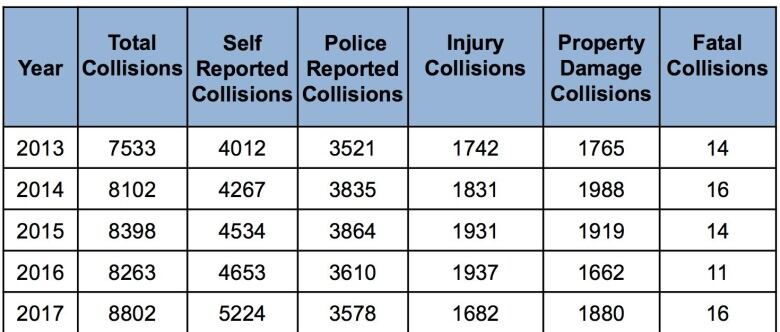Where and when collisions affecting drivers, walkers and cyclists happen on Hamilton roads
City looking at prioritizing roadway safety issues based on stats

In the first report of its kind, the City of Hamilton is analysing collision trends from a five-year period as a means to identify priority roadway safety issues.
"The 2017 Annual Collision Report" breaks down 13 sections, addressing things like red-light camera statistics, Lincoln Alexander Parkway collision statistics, pedestrian and cyclists collisions and overall trends.
That totals 41,098 collisions in five years and of those, 71 were fatal.

According to the report, the total number of collisions has been increasing each year since 2013. However, the number of collisions with police involvement has declined since 2015. There was a reduction of 255 injury collisions from 2016 to 2017, says the report.
The stats were presented at a general issues committee meeting Wednesday, just days after the public works committee voted to spend money on traffic calming, speed limit reductions, flashing signs, lawn signs, education campaigns and other measures.
The report is a collaborative effort between the public works department, Hamilton police services, Hamilton fire department and healthy and safe communities department.
The city says it's the first annual edition of a "high-level" review of motor vehicle collisions occurring on Hamilton roadways.
"The statistics and analysis will provide the Hamilton Strategic Road Safety Committee with the information to identify priority roadway safety issues," read the report.

It's designed to align with the principles of "Vision Zero" — a goal to eliminate road deaths.
When it comes to deaths in 2017, 50 per cent happened on rural roadways and the other half on urban roadways.
The report says the majority of deaths happened during clear, dry conditions at midblock locations.
In 2017 there were 239 collisions involving pedestrians and 176 with cyclists.


Collisions by time
Over the past five years, the highest average number of collisions happened in October with April seeing the lowest average.
The report goes further breaking down the timing. Friday claims the highest day of the week for collisions accounting for 16 per cent with Sunday at 11 per cent.
The highest collision hour falls from 2 p.m. and 3 p.m.

With a look at who's behind the wheel, over 20 per cent of drivers were between the ages of 21-30 years old with the most common age averaging at 23. The report points out that these drivers were involved in collisions, but not necessarily the person at fault.
Dundurn Street and King Street is the intersection with the highest number of collisions, Kenilworth Avenue and Main Street has seen the most pedestrian collisions and Cannon Street and Wellington Street has the highest number of cyclist collisions.